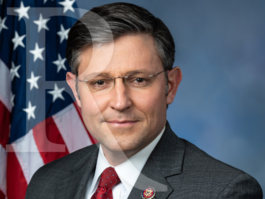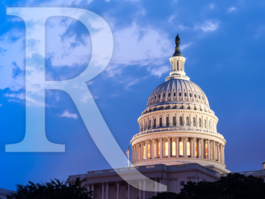The Populist Revolt Against Brain-Dead Politics
A Commentary By Larry J. Sabato
Take a deep breath. It won’t help you understand what’s happening in the contest for the presidency, but it won’t hurt either.
By contrast, many media analyses of the state of the race have reached the breathless level. Supposedly, there’s never been anyone like Donald Trump on the political scene. In fact, there’s a long tradition of anti-establishment outsiders making a splash. Conventional wisdom says Hillary Clinton is close to throwing away her second chance at the White House. Actually, while she’s been very unimpressive as a candidate in this cycle, Clinton’s many advantages still make her a strong favorite to be the Democratic standard-bearer (absent an indictment).
Yet observers are right when they insist “there’s something going on out there.” And in our view, what’s going on is a populist revolt against the utterly predictable, locked-in, hyperpartisan politics of the two major parties.
The most important word is “predictable.” While there are 22 presidential candidates — 23 if Biden runs — most of them are human tape recorders. On the top 25 or 30 issues, each has memorized a paragraph or two; mention the issue and the candidates push the “play” button in their heads. Almost word-for-word each time, they recite the pollster-researched, consultant-approved soundbites designed to produce a Pavlovian response in partisans.
Problem is, Americans would generally prefer to elect a human being, not an automaton. It’s at least possible that a few more intractable problems would get solved if potential presidents were less inflexible — or so it appears to many voters.
Whatever else you think of him, Trump is no automaton. He isn’t rehearsed, at least compared to the others: We can’t take our eyes off him because we’re not at all sure what he’s going to say next. Ben Carson, who is now second to or even tied with Trump in some Iowa surveys, is another anti-politician; he combines bluntness and a soft-spoken, gentle approach that is unusual in politics. Carly Fiorina is a third Republican contender who can generate unconventional responses that don’t sound rote. These are candidates who have never been elected to anything. To some, that’s an attractive feature, not an outstanding flaw, of their candidacies. Their outsider images are reinforced by their respective tones, which stand out as different in a field filled with talking-point machines.
On the Democratic side, Bernie Sanders says he doesn’t have a pollster — and instinctively, we know it’s true. No pollster would let him say some of the things he says in quite the way he says them. Yet his presentations are more appealing because we know we’re hearing precisely what Sanders believes, and hang the consequences.
Paradoxically, not caring about electability sometimes makes a politician more electable.
Joe Biden fits nicely into this construct. Yes, as the sitting vice president with a large staff and loads of political advisers, he’s as establishment as they come. However, as Biden has proven many times, he’ll say whatever is on his mind. This quality keeps his team awake at night, but it has endeared him to many — and more to the point, what you see is what you get. The public often feels isolated and cut out of the loop by the powerful, yet if the voluble Biden ever concocts any secret insider plan, odds are the plan won’t stay secret for long.
Compare these more transparent politicians to establishment favorites Hillary Clinton and Jeb Bush. With Clinton, as with her husband, you never think that you’re getting the whole story; you suspect each carefully chosen word hides the complete truth. Moreover, you instinctively know the full story is far more interesting or entertaining than the bits she’s shared with you. These impressions come packaged with a bubble-wrapped candidate who minimizes extensive press questioning and tends to avoid unrehearsed, substantive contact with unscreened voters. Long the party’s apparent “chosen one” for 2016, she conveys a sense of entitlement and a somewhat grumpy, presumptuous attitude that pervades the candidate and her campaign.
Jeb Bush has been more willing to engage the news media and average voters than Hillary Clinton, but he has little choice in a field of 17 and in a year of discontent. Both Bush and Clinton radiate the status quo — a combination of dynasty, oligarchy, and plutocracy that puts off many Americans. The most repeated phrase we’ve heard in the last six months from casual observers is, “No more Bushes, no more Clintons.” Would anything confirm politics’ brain-dead status more than a second Bush-Clinton contest for the White House?
Bush has a task more difficult than Clinton, at least in the nomination stage. He has to convince the GOP that nominating a third member of his nuclear family will yield a new, improved product. Retrospectively, while Republicans have warm personal regards for both ex-Presidents Bush, most party activists are not fans of the three Bush terms — and the general electorate contains far more numerous and harsher critics. Jeb can proclaim daily that he’s his “own man,” but if his name were Jeb Smith, he wouldn’t even be on the stage. His surname has created a campaign stuffed with past Bush appointees (many of whom likely want another post), past Bush policies (many of which are now unpopular), and past Bush donors (about half his money has come from contributors to his father and brother).
A fancy arrow in Hillary’s icon and an exclamation mark on Jeb’s signs cannot make these candidates more exciting, futuristic, or appealing. As a former Clinton White House official told the Financial Times recently, the public is rejecting processed foods in favor of organics.
Most mainstream analysts think Trump fever will break once the winnowing process reduces the number of Republican candidates so that other contenders — augmented by a large majority of GOP leaders who abhor Trump — can define him as insufficiently conservative. The identity of the actual Republican presidential nominee, though, remains obscured.
On the Democratic side, while no one can predict the outcome of the email investigation, the current assumption is that Clinton’s advantages remain potent enough to carry her to the nomination against her opponents, whether Biden is one of them or not.
As usual, the state of the economy, war and peace, and especially President Obama’s job approval rating will strongly influence the November 2016 results, but the winning candidate also must find a way to triumph in the battle for authenticity. As phony as politics can sometimes be, the voters don’t seem in a mood to let the winner fake it this time around. We also have to add the caveat that every now and then, parties go off the rails or explore new territory on foot, or as the Monty Python troupe used to say, “And now for something completely different.”
In the meantime, just keep two facts in mind. First, polls taken in 2015 about the 2016 presidential contest are as solid as a sand castle built on the sea shore — and it’s hurricane season. Second, voters (especially in Iowa and New Hampshire) are just test-driving candidates like cars. They find features of several contenders to be appealing, but they realize no final purchase is needed until February.
Larry J. Sabato is the director of the Center for Politics at the University of Virginia.
See Other Political Commentary by Larry Sabato
See Other Political Commentary
Rasmussen Reports is a media company specializing in the collection, publication and distribution of public opinion information.
We conduct public opinion polls on a variety of topics to inform our audience on events in the news and other topics of interest. To ensure editorial control and independence, we pay for the polls ourselves and generate revenue through the sale of subscriptions, sponsorships, and advertising. Nightly polling on politics, business and lifestyle topics provides the content to update the Rasmussen Reports web site many times each day. If it's in the news, it's in our polls. Additionally, the data drives a daily update newsletter and various media outlets across the country.
Some information, including the Rasmussen Reports daily Presidential Tracking Poll and commentaries are available for free to the general public. Subscriptions are available for $4.95 a month or 34.95 a year that provide subscribers with exclusive access to more than 20 stories per week on upcoming elections, consumer confidence, and issues that affect us all. For those who are really into the numbers, Platinum Members can review demographic crosstabs and a full history of our data.
To learn more about our methodology, click here.



